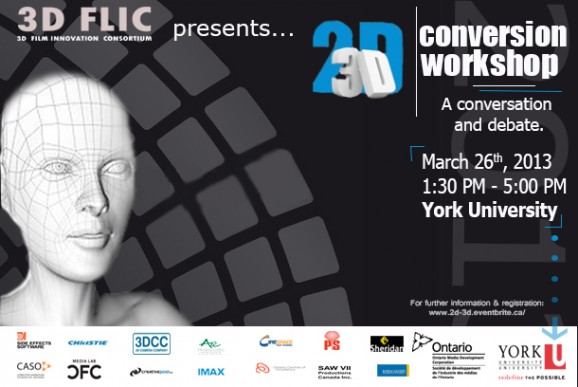Toronto’s 3D Film Innovation Consortium (3DFLIC) presents top industry experts and scientists on March 26, 2013 discussing and debating the hottest topic in contemporary Stereo-3D cinema: “When and Why Should I consider 2D to 3D Conversion?” This intimate forum will provide a unique opportunity students, professionals and academics to learn from and interact with leaders and pioneers in the world of stereoscopic filmmaking and scientists and engineers developing the next generation of 3D filmmaking techniques.
The recent success of stereoscopic-3D Cinema has been enabled by the latest advancements in digital imaging technology. ‘Native’ stereo-3D capture has become increasingly easier and more familiar to the filmmaking community; but so has the economic, technical and artistic viability of converting new or existing 2D to 3D.
The discussion on whether to prefer “native capture” or “conversion” has been a key debate in 3D-Cinema’s contemporary existence. Today, with the vast availability of 3D projection screens, the discussion is as relevant to the filmmaker as ever: Should I shoot a shot or entire film native 3D? Should I convert from 2D? Should I shoot in 2D aiming to convert to 3D? What are my options? What do options mean? What does 2D to 3D Conversion involve?
Hugh Murray and Paul Judkins of IMAX; James Elder of York University and Carlos Vazquez of Canada’s Communications Research Centre (CRC); Roy Anthony of Christie Digital Inc., Rob Burton of Arc Productions Inc., James Stewart of Geneva Films and Eric Deren of Dzignlight Studios present and discuss these matters at Toronto’s York University on March 26, 2013, 1:30 PM EST.
For colleagues unable to be present due to travel and distance considerations the workshop is also going to be webcasted, live, in 2D/HD. (*)
For further information and registration details please visit: http://2d-3d.eventbrite.ca/
See you at the Workshop!
(*) Third party recordings and/or public dissemination of the workshop’s live webcast are strictly forbidden without the prior consent of the workshop organizers and/or individual presenters.

 3D Film Innovation Consortium
3D Film Innovation Consortium














